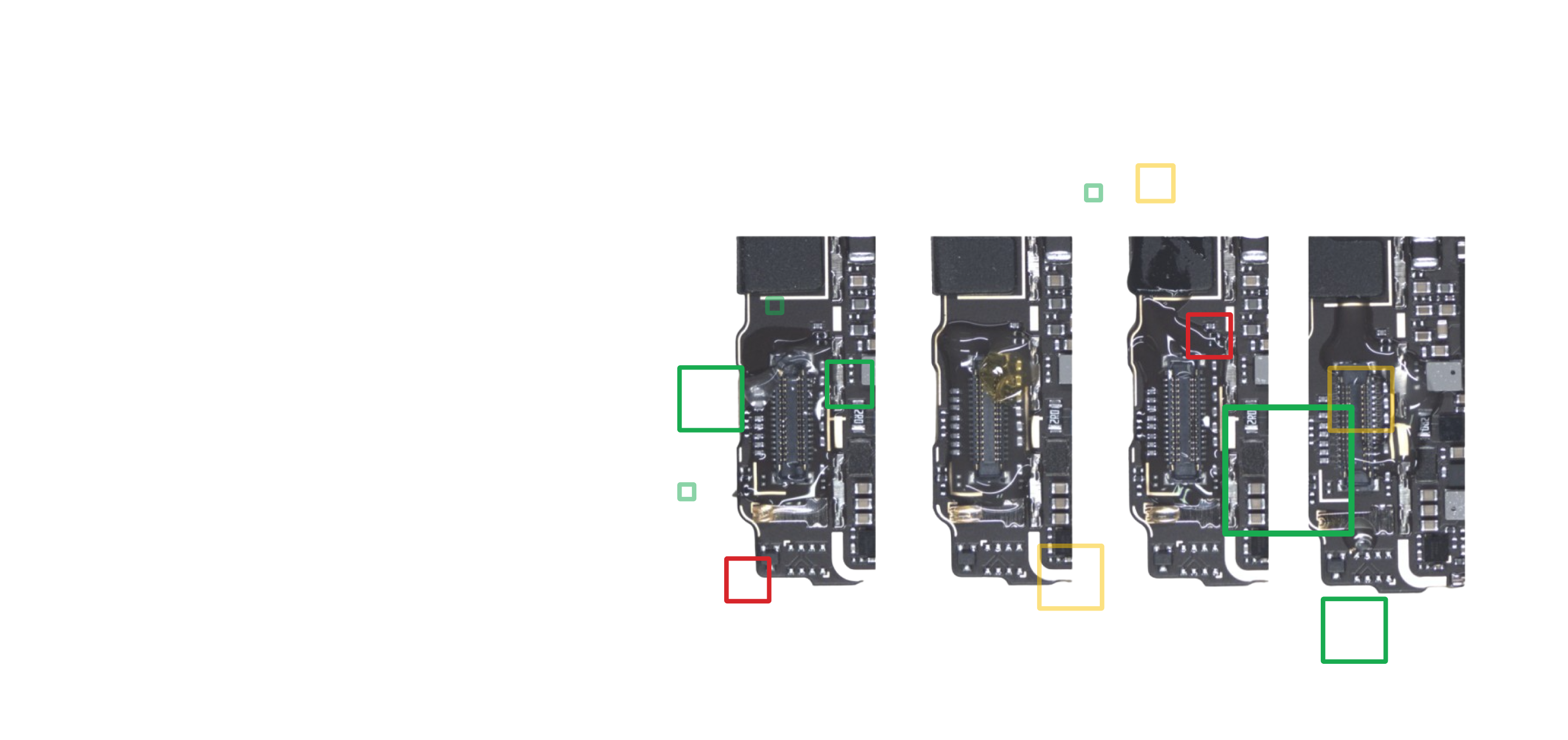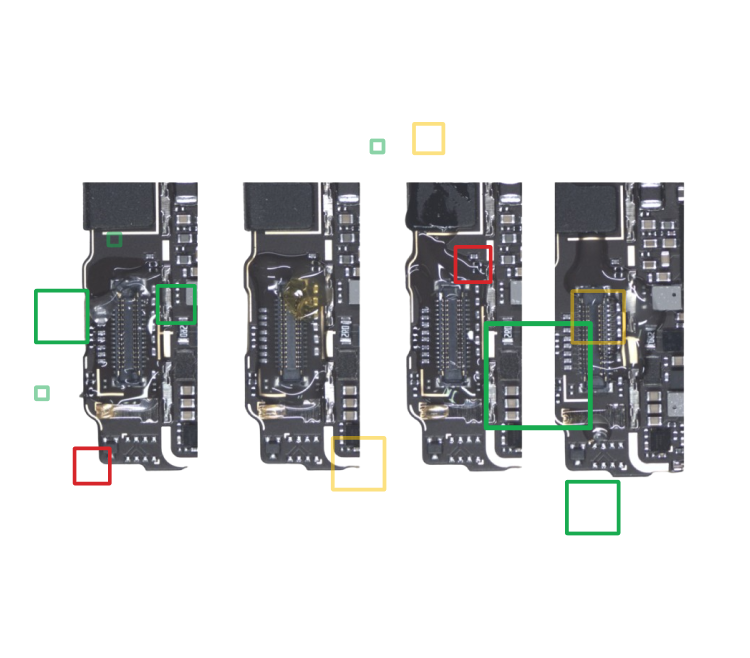Liquid nano-coating leader P2i re-invents issue diagnosis and quality control during development of high-precision IPX6-IPX8 rated Dunkable ® coating
Waterproofing has become table stakes in an increasing number of electronics categories – from phones and tablets to speakers and wearables. Coatings and potting are two common elements of many waterproofing strategies, yet quality control for these critical materials is incredibly challenging.
Achieving a controlled application of the coating is difficult because it can be impacted by temperature, pressure and a myriad of other factors. Validating that the coating was deposited correctly can be even more difficult, as many materials are clear and amorphous, making them difficult to write specifications around.
When P2i, a global leader in liquid repellent nano-coatings, discovered that their existing manual quality assurance process was leading to critical escapes downstream in early development, they knew they needed more than manual inspection.
P2i partnered with Instrumental to overhaul their approach to issue discovery and prevention end-to-end. Instrumental technology made it possible for them to discover, characterize, and intercept 78 different issue types during development and production. The technology enabled continuous, remote process improvement through more complete data and the ability to fine-tune quality control tests remotely.
P2i reduced manual inspector headcount by 50%, eliminated customer-reported defects and tripled engineering capacity to solve issues.
We rely heavily on Instrumental to make sure that what happens is what is meant to happen.
- P2I’s PRINCIPAL APPLICATION SCIENTIST
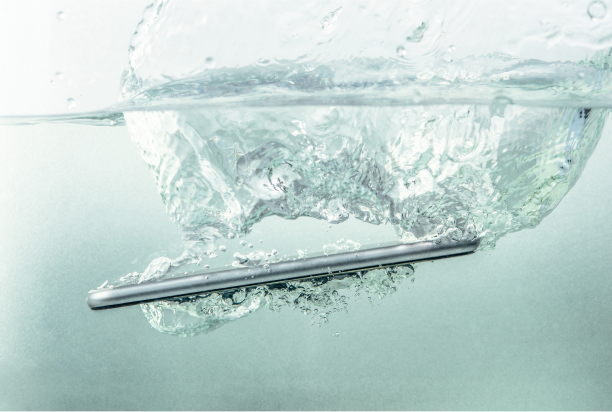
The following is an abridged version of the case study.
The Challenge
The first use of Dunkable® on a commercial product presented several new challenges for the P2i team.
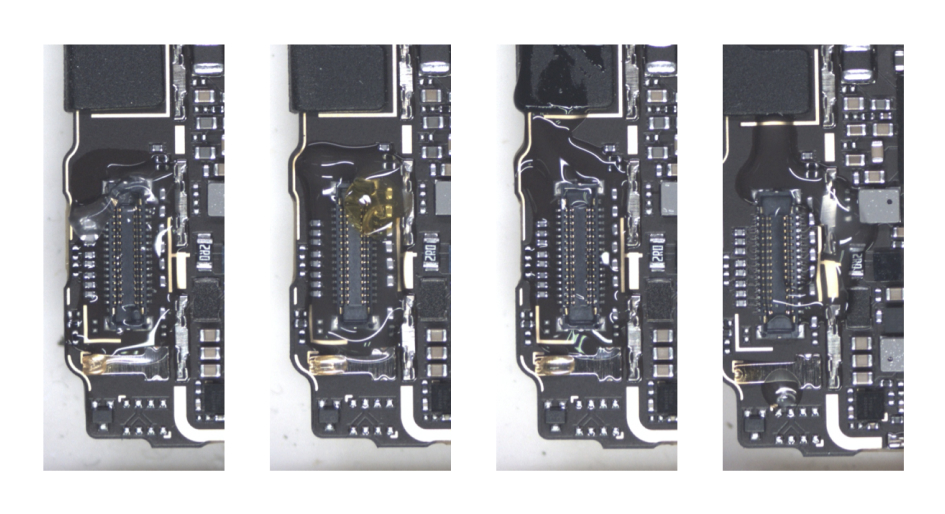
Unlike traditional vision systems, Instrumental’s AI is uniquely suited to detect amorphous coating defects such as overflow, contamination, handling issues, and registration shift.
Encapsulation issues are difficult to diagnose with traditional methods
Encapsulation processes present unique challenges, both during development and for production quality inspection. For Dunkable® to work, coverage must be complete. To achieve this, the encapsulation coating is applied as a liquid and then cured to a hard coating afterward. This liquid process is a challenge because:
- Coatings are translucent, making it difficult to identify defect types visually
- Variations are subtle and may not cause obvious issues during reliability testing.
- Variations are irregular, making it particularly difficult to design final inspection specifications
Traditional vision systems don’t perform well on highly variable, amorphous materials. This led P2i to rely on manual inspection operators, which was expensive.
Lifetime IPX8-rated protection requires superior traceability
With Dunkable®, each component at risk for water damage is protected with a coating – instead of keeping water out with gaskets, water is allowed in and the coating will protect the components.
Because the very function of the device after a water event relies on complete coverage, P2i was keen to build a traceable data record of every unit they encapsulated. If a problem occurred in downstream manufacturing or in the field, P2i wanted to be able to show that they had delivered parts within specification.
The P2i team also realized that the data record might come in handy to facilitate communication between their coating’s engineers in the UK and the factory in China. They were eager to leverage in-process data to more quickly identify and correct issues as they happened in development.
Manual inspection fell short, and issues reached P2i’s downstream customer
One of P2i’s first Dunkable® engagements was on a client’s flagship smartphone. That client already employed Instrumental to discover issues during development and was able to use Instrumental to quickly share anomalies which they discovered downstream.
Having witnessed the inconsistencies of manual inspection and experienced the benefits of Instrumental firsthand, the P2i team identified an opportunity to upgrade their approach to quality. Adopting Instrumental’s manufacturing optimization platform provided P2i with inspection consistency and a traceable data record, ultimately reducing manual inspector costs by 50%, tripling engineering capacity, and eliminating customer reported issues.
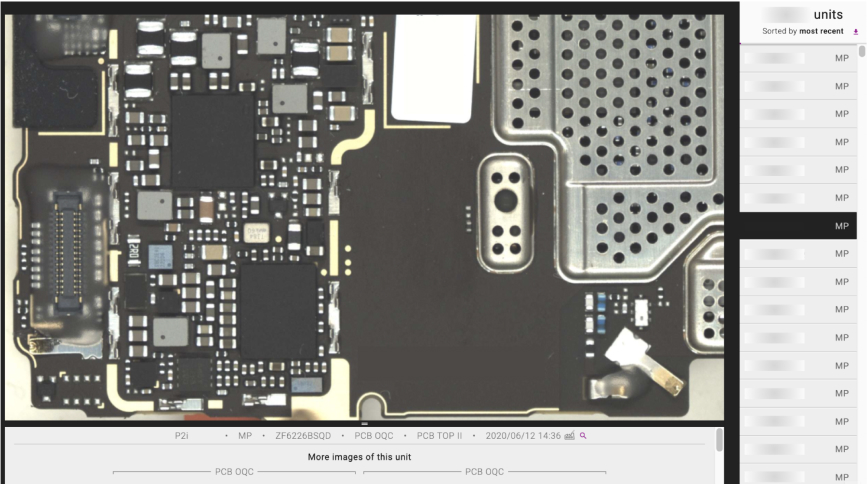
Instrumental’s traceable image data record enables teams to view photos, accelerating their failure analysis process and streamlining communication. P2i’s smartphone client used Instrumental to pinpoint an issue with P2i’s coatings and shared Instrumental images to streamline communication.
The Solution
To address their smartphone client’s quality concerns and optimize their development process globally, P2i turned to Instrumental’s optimization platform for several key reasons:
- Ease of deployment
- Providing visibility across the supply chain
- Proactive detection of irregular and hard-to-categorize defects
- Integrated remote line test management

Instrumental’s optimization platform collects a visual history of every unit at every key assembly stage.
Easy deployment and visibility across the supply chain
Instrumental is uniquely designed to be lightning-fast to set up, and P2i was able to implement Instrumental collection points on their lines in a matter of weeks and start collecting data within 24 hours of installation.
Because Instrumental is cloud-based and flexible, the P2i team and their customer were able to establish a shared project that spanned P2i’s nano-coating process and the downstream smartphone FATP factory in China. Both groups were able to remotely and securely monitor their part of the process and collaborate through the platform.
Intelligent, proactive issue detection
Because P2i was introducing a novel design concept, they expected to encounter more novel issue types, which would be particularly tricky because of their liquid process. Manual inspection and traditional AOI were inadequate for this purpose.
Instrumental’s AI was uniquely able to identify dozens of new and irregular anomaly types because the system does not rely on defect examples and is able to find and categorize anomalies across the entire field of view with a high degree of accuracy.
Instrumental was the only end-to-end system that combined proactive defect detection with the remote data traceability the P2i team needed to diagnose and fix issues during both development and production.
Remote line test management in a single system
Instrumental is the only system designed to support product engineers from early development through to mass production by making it easy to leverage data from every build to easily create and tune production-grade pass/fail tests for their fully ramped lines, and manage them while completely remote.
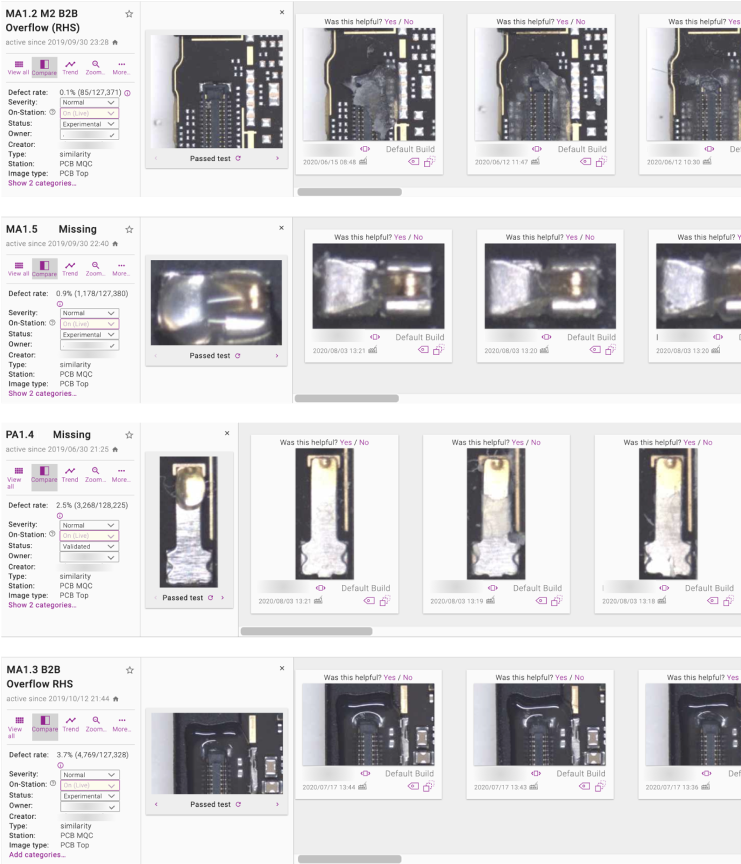
The P2i team used Instrumental’s AI to detect a variety of coating defects, such as missing or overflowed coatings, live on the line. Manual inspectors were inconsistent with detecting these defects when compared to Instrumental.
Deep understanding of every issue on the pareto
For the first time, P2i could review defect rates and monitor not just top issues – but nearly every issue type – with Instrumental’s real-time analytics. P2i’s Principal Applications Scientist shared, “We rely heavily on Instrumental to make sure that what happens is what is meant to happen.” In total, the P2i team set up 78 live AI tests to detect missing material, incomplete coverage, and overflow.

Instrumental’s Discover AI highlights potential anomaly hotspots automatically for P2i, the red color indicates high levels of anomalies. P2i engineers can review the results and identify new defect types they may not have previously been looking for.
Traceable data accelerates fully remote failure analysis
In addition to visually proving quality, the Instrumental image data record accelerated engineering failure analysis – the P2i team could do more than just identify defect types – they could investigate the root cause and design solutions virtually.
P2i’s Principal Applications Scientist, shared, “It’s great to get hard data on what happened to a board set, and when. It’s great in fixing problems, and in providing proof of quality to our downstream customer!” The P2i engineering team improved efficiency by 300%, estimating that with Instrumental software one engineer could solve the same number of issues as two to three engineers normally would.
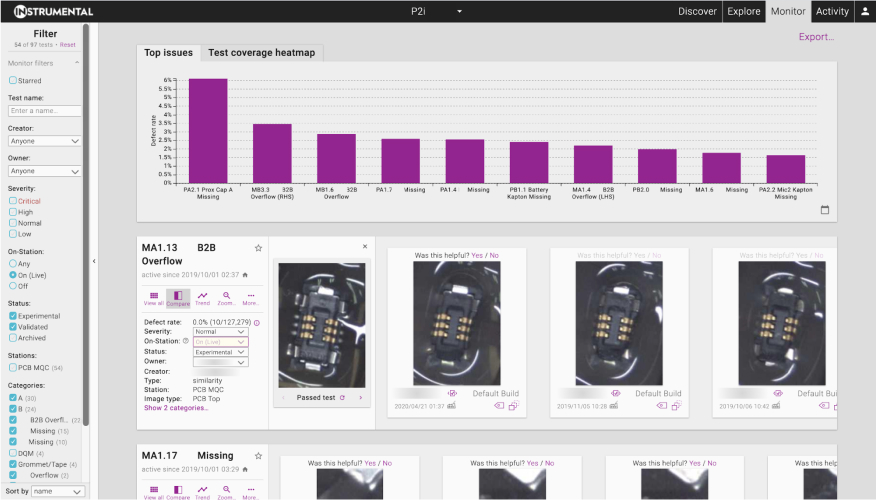
Instrumental’s easy-to-use software enabled the P2i team to execute their quality control process with less effort. The combination of a visual data record and real-time analytics enabled engineers to tackle more issues faster.
100% remote optimization, before and during COVID-19
Before COVID-19, P2i relied on Instrumental to close the loop in their geographically distributed process. They manufacture in China, monitor their lines in real-time from the UK, and push test updates to their deployed, distributed fleet of Instrumental collection points without any travel.
This end-to-end workflow of continuous optimization was critical to the success of Dunkable® before travel restrictions were in place. Now, their advanced preparation has enabled them to continue to improve product stability even through significant international disruption.
P2i’s Principal Applications Scientist, noted that monitoring and adjusting quality thresholds remotely is critical, stating that, “It’s normally something I’d only be able to do on-site, I’d have to actually fly there, and this lets me do that remotely which is very important to us.”
P2i’s COO also shared that, “This ability to remotely control and monitor quality is fantastic!”
This ability to remotely control and monitor quality is fantastic!
- P2i COO
The Results
P2i’s core objective was to eliminate quality escape in a mission-critical phase of their game-changing new product line. Instrumental was central to satisfying extremely high customer quality expectations, reducing costs, and continuing to make quality and efficiency improvements even after production had started.
By implementing Instrumental as an end-to-end process improvement, P2i saw a positive return on their investment in Instrumental which drove expanded partnership.
P2i evaluated the ROI of Instrumental in three core areas: proactive issue discovery, cost reduction, and quality improvement.
Proactive, Expedited Issue Discovery
78 unique AI tests outperformed manual inspectors
Instrumental takes a radically different approach to issue monitoring. Instead of forcing engineers to pick only their most critical issues to invest the time and expense to track, our system enables unlimited, simple monitors that can be used to track every defect discovered – even infrequent but critical ones.
Because of Instrumental’s ultra-simple cloud-based software, the P2i team was able to set up 78 unique issue monitors to cover the full gamut of defects and anomalies they were concerned with. UK-based engineers to then pushed these tests live to their lines in China and could continue to tune them remotely.
Engineers were also able to use Instrumental’s live Paretos and build analytics to maximize engineering efficiency by keeping focus on the most important issues.
Eliminated all issues reported by downstream smartphone client
P2i leveraged Instrumental to eliminate all issues reported by their smartphone client, resulting in continued expansions on the next program for both P2i and Instrumental. Future client conversations were also supported by a valuable data record, enabling the team to defend quality claims with visual evidence.
Optimized quality while 100% remote during COVID-19 travel bans
When COVID-19 restricted travel to factories, P2i was uniquely prepared to keep quality and production on track. With Instrumental, the P2i team was able to access real-time data from the factory and continuously make improvements to their quality control process from the safety of their homes. Instrumental’s images, reports, and alerts kept their team in sync and productive while others in the industry floundered.
Reduced Costs
Reduced manual inspector headcount by 50%
Prior to Instrumental, P2i relied on expensive manual inspectors to catch coating defects. Now Instrumental is P2i’s primary quality control method, responsible for intercepting a wide range of coating defects and preventing them from entering customer factories and products. This change in process resulted in a 50% reduction in headcount for manual inspectors while maintaining 110 UPH.
Tripled engineering efficiency
Real-time access to Instrumental’s images and reports contributed to faster failure analysis and better allocation of engineering resources – the team estimates that without Instrumental they would have needed 2-3 engineers to tackle the same number of issues that a single engineer solved with Instrumental. Instrumental also contributed to more than a 65% reduction in the number of people traveling to the factory during each build, saving hours of engineering time.
Instrumental is now P2i’s primary quality control methodology
P2i’s COO shared, “Quality is a combination of the right process and the right practices. Instrumental’s data helped us to improve our coating application processes, resulting in better parts. They also improved our inspection practices, allowing us to move away from unreliable and expensive operators to trusted, 100% validation. We are excited to continue our partnership.”
Continuing Partnership
Positive ROI and process improvement has driven an expanded partnership between P2i and Instrumental for both development and production programs.


